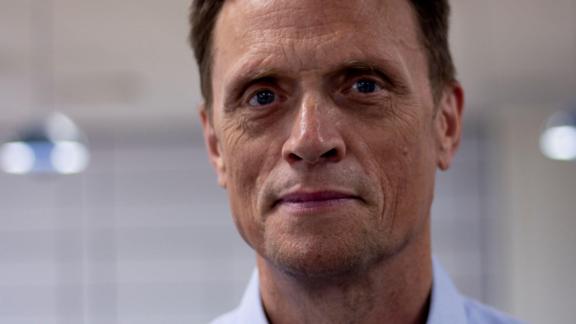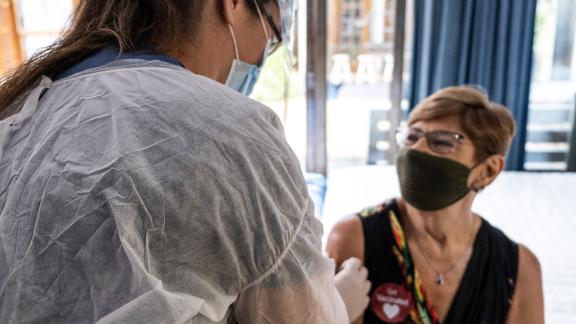Strengthening the social contract of vaccination

Focusing on vaccination can be a gateway to thinking differently about how to address the core challenges facing the health service.
I recently had a fascinating discussion with Steve Russell, NHS England’s chief delivery officer and national director for vaccination and screenings, about the national vaccination strategy.
We talked about how vaccination is almost certainly the most cost-effective health intervention we can make with our limited resources, and how the recent national strategy’s focus on making access as easy as possible is to be welcomed, and how integrated care systems can overcome delivery challenges given their pivotal role.
But perhaps the most interesting part of our conversation explored the connections between vaccines and the wider shifts necessary for the success and sustainability of the NHS. There are three shifts that I believe are essential.
Government must support health improvement
First is the need for wider governmental support for health improvement. The NHSE strategy is great, but it would have been stronger still had it been produced through a cross-Whitehall initiative. Treasury engagement might have led to more investment; Department of Education buy in is crucial given the role of schools and other education settings; the Department of Science, Innovation and Technology is vital to issues of biomedicine and supply; DWP could have used its networks to help reach excluded communities and encourage employer action. The list goes on.
Indeed, given how few public policy interventions are so obviously good for citizens, the nation and its finances, vaccination could and should be a national priority, reinforced by the authority of the Prime Minister.
This takes me to my second point: the way we think about the relationship between health resources and the needs of the public.
The problem is the need to drive greater public demand, especially among less advantaged communities
In the face of challenges of access, waiting and implicit rationing, the dominant paradigm for NHS resources sees the problem in terms of the public’s nearly insatiable need and demand for treatment. But the challenge of vaccination, and screening – another growing and cost-effective set of interventions - points in the opposite direction. The problem is the need to drive greater public demand, especially among less advantaged communities.
But aren’t preventative measures different from reactive treatment? Perhaps not as much as we think. All medicine is preventative in one sense, even palliative care is seeking to prevent unnecessary pain and suffering. Across all forms of treatment, research shows patient engagement leads to better experiences and outcomes.
Also, across the UK, providers are changing the pathways they use to engage with communities. For example, Dr Jagan John, a GP in Barking has conducted successful walk-in sessions in the borough’s local libraries. Thousands of people attended the events, which are supported by welfare, mental health, and social care colleagues. The approach is similar to that developed by the Sussex MSK service where, in April 2023, a two-day event saw 550 patients on the MSK waiting list invited for a review by an MSK clinician and the chance to engage with other health and care services and community groups. This coordinated approached resulted in over half of patients deciding to access wider support and therefore being able to leave the waiting list. If instead of seeing the problem of health policy as being how to manage demand, we saw it as how to increase engagement, I suspect it could fire our imagination and help change an increasingly negative public NHS discourse. After all, such a shift has a direct corollary with how we need people to think: not of healthcare as something we worry about and only turn to when we have to a problem, but as a positive part of how we routinely manage risk and get the most out of our lives.
The social contract of vaccination
This brings me onto my final point. Vaccination is a good case study of what I have described as the ‘social contract’ between the NHS and the public. Vaccination is good for individuals but also for everyone else by reducing infection and future demand on limited health resources. However, the social contract that underpins this understanding has been weakened by the factors I describe above and in part the rise of the anti-vaccine movement, which draws on the sometimes understandable mistrust of authority and the toxic impact of misinformation accelerated by the profit motives of social media providers.
It is also fair then to view getting ‘jabbed’ not as an individual decision, but instead acknowledged as a key aspect of active citizenship
During Covid, from the Prime Minister down, there was a concerted effort to understand and overcome these barriers and promote vaccination. But we need to keep the social pressure on. As the NHSE strategy underlines, making access easy and reaching out to excluded communities is vital. Too often we are not doing enough to go to where people would more easily be able to access vaccinations and we need to be creative in how we reach out, so that we make it as frictionless as possible. However, the social contract is also about how citizens can take a less transactional and more participatory role in the health service. It is also fair then to view getting ‘jabbed’ not as an individual decision, but instead acknowledged as a key aspect of active citizenship.
This though is not about blaming individuals who don’t take up vaccinations, or making them feel that by being hesitant they are responsible for the challenges of the services, but about engendering a conscious understanding that the two are not mutually exclusive. Individual actions, in this case getting yourself and your loved ones vaccinated, can make a profound contribution to the success and sustainability of the health service.
Focusing on vaccination is important to the nation’s health and the sustainability of the NHS, but it can also be used as a gateway to thinking differently about the core challenges facing the health service and how we might go about addressing them.
Matthew Taylor is chief executive of the NHS Confederation. You can follow Matthew on X (formerly Twitter) @ConfedMatthew



